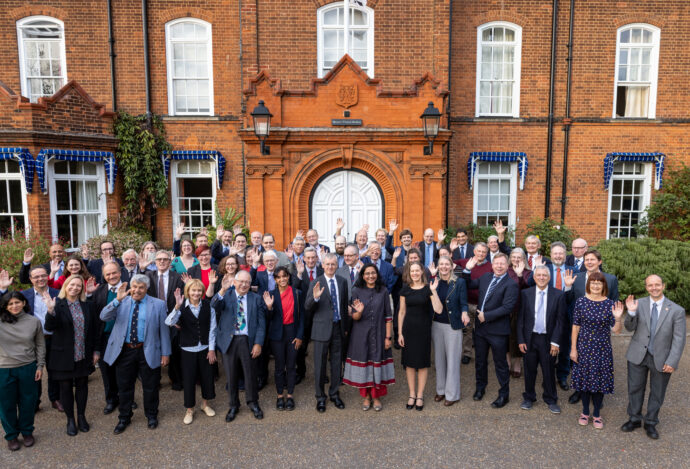Hughes Hall’s 2023 Senior Members’ Symposium conducts a lightning tour through some of the leading research going on across College.
Earlier in June, we celebrated our annual Seniors’ Symposium, with Presidents past and present, and a wide range of Senior Members across all subjects, and many professional arenas.
Fifteen Fellows gave lightning talks presenting their current research focus, providing a fantastic overview of the depth and breadth of interests in college. Many of the presentations have significant policy implications, and many touch on the risks and consequences of inequality.
Professor Nidhi Singal, Vice President, curated the event: “This really is a highlight in our college calendar. It is not often that we engage with such a wide range of progressive and transformative ideas from different realms of research in one evening. This is where a college like Hughes Hall shines through – the nurturing of intellectual scholarship among all members of our community and the convening of multidisciplinary spaces to enable those at different stages in their research journey to come together for something bigger than the specific project they are working on”.
Within the Education field, Tobias Kohn considered how ChatGPT could be used positively in education and its effect on power imbalances in the classroom. Maya Ganesh told us about the Masters course in AI and Ethics which she is running for working professionals who need to keep up with technical and societal changes. Alison Twiner discussed movement-based learning, including linguistic analysis of drama-based lessons on the Great Fire of London and teaching mental health techniques using embodied interpretative space.

Dr Aga Iwasiewicz-Wabnig, Hughes Hall Fellow and Maxwell Centre Director of Partnership Development, discusses the important of partnership with industry, for making a difference in academia.
Economics and Business talks included Emanuele Giovannetti on models of the economics of data portability and the effects on consumer surplus of the costs of switching between platforms. James Root presented an international survey of employees in 19 countries which identified six personality archetypes who can be expected to respond differently to the changing structure of employment. Aga Iwasiewicz-Wabnig introduced the Maxwell Centre as an engine of movement for taking ideas to the marketplace, collectively accelerating research and entrepreneurial progress.

Our researchers put a pin in the map to represent where their research is having an impact; and we were delighted to welcome three Presidents of Hughes Hall to take part in the Symposium: Anthony Freeling (2014-2022), Sarah Squire (2006-2014), and Laurie Bristow (2022-present).
Sir Laurie Bristow, President, said: “This evening’s presentations tell an inspiring story of ideas and determination to make a positive difference to society. Our College is well placed to continue making a difference into its next 125 years. Communicating what we do to a broad audience is critical to our development, and events like this are part of that work. Thank you to all the Senior Members and the staff who make it so memorable.”
Janek Gröhl introduced us to photoacoustic imaging of cancers using a digital twin model to simulate pressure waves through oxygenated tissues. Alex Reid took us through the financial and sustainability savings, and improved patient experiences, achieved at Addenbrookes by performing hand surgery under local rather than general anaesthetic in the Wide Awake Surgery Programme.

Panel Chair and former College President, Sarah Squire, leads discussions with a panel including, Prof Riikka Hoffman, Dr Tori McKee, Dr Engy Moussa, Prof Tamsin Ford, and Dr Aga Iwasiewicz-Wabnig.
Junwei Wang showed us how permanent iridescent colours could be created as nanostructures by genetically manipulated bacteria and grown overnight. Lewis Stevens described using PCR to find the genetic sequences of nematodes and explained that the most diversity is found in the coding for secreted proteins, with implications for vaccine development. Guillermo Serrano Nájera explained the structural differences in mesendoderm development during gastrulation in early embryonic development between chickens and frogs.
Tori McKee explored historical adaptations of Euripides’ Hippolytus and their different approaches to queerness as an explanation of Hippolytus’ rejection of Artemis. Engy Moussa explained the benefits to states, especially non-democratic states, of using private security services particularly where there is a history of uprisings. Tamsin Ford looked at UK Child Mental Health Surveys which showed a statistically significant decline in mental health even before the pandemic, most notably in young women and younger boys, which is closely tied to insecurity of food, housing, and finance. Riikka Hofmann looked at the difficulty of improving services in the public sector due to the paradoxes of people, agency, risk, and norms, and proposed an approach to professional learning rooted in operationalising the skills and knowledge of staff.
For more information:
Our Senior Members: https://www.hughes.cam.ac.uk/about/our-people/seniors-members/
Our Bridge Centres: https://www.hughes.cam.ac.uk/academic/the-bridge/bridge-centres/
28.6.23





